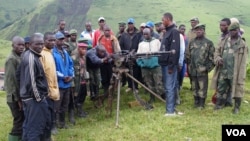GOMA —
People who have fled from the Democratic Republic of Congo's eastern conflict zone say the armed groups that control their villages have imposed a new rule: each family must buy a firearm from the local armed group, or face unpleasant consequences.
There are many firearms in Masisi territory, the part of eastern Congo that saw the country's worst inter-ethnic violence last year. Now, according to people who fled the territory, gun ownership has been made virtually compulsory in some of the villages.
These displaced people, who are from various tribes and many of whom are ethnic pygmies, are living at a camp at the village of Shasha on the fringes of Masisi territory.
Conditions at the camp are basic. A church service was being held outdoors.
Adolphe Bonane is the so-called president of the camp, and a pygmy.
He said that people who tried to go back to their villages and work their land were told by the armed groups that they must buy weapons.
A group of about dozen camp residents confirmed it. Nyirumba Vuleta was one of them.
Vuleta said he was harassed when he went back to his village. The armed men controlling the area told him that because he had a field, he must have a gun, and if he did not obtain a gun he must leave.
According to camp president Bonane, there was a third option, but it amounted to slave labor.
He said the reason villagers were forced to buy weapons was so that they could defend their villages if they were attacked.
Villagers who don’t buy weapons were ordered to work, without pay, as guards. If there is any further disagreement with the armed group, they face the possible loss of their land.
The gun-buying rule was introduced in May in Masisi and Walikale territories, and the armed groups involved are the Nyatura and the Raia Mutomboki.
As of April, said Bonane, you could buy an AK-47 assault rifle in these districts for just $25 or $30.
Politicians and some army officers were supplying these weapons, he said, but he and many others refused to arm themselves because they feared being mistaken for rebel fighters.
Bonane's group named several politicians who distributed weapons, among them Jean-Bosco Sebishimbo, a deputy in the North Kivu provincial parliament.
Sebishimbo denied the accusation. “It makes me laugh,” he said. He blamed “powerful individuals” for slandering him due to his political popularity.
“Certainly there are politicians involved in distributing guns to armed groups,” he said, but he couldn't say which politicians, except for those who have proclaimed their affiliation to the M23 rebel group.
The civil society association of North Kivu said it has heard that armed groups were forcing people in Masisi to buy weapons. The association’s vice president, Omar Kavota, said he would soon be revealing which politicians were distributing firearms.
A source at the United Nations mission in Congo said an investigating team would go to Shasha to investigate the claims.
There are many firearms in Masisi territory, the part of eastern Congo that saw the country's worst inter-ethnic violence last year. Now, according to people who fled the territory, gun ownership has been made virtually compulsory in some of the villages.
These displaced people, who are from various tribes and many of whom are ethnic pygmies, are living at a camp at the village of Shasha on the fringes of Masisi territory.
Conditions at the camp are basic. A church service was being held outdoors.
Adolphe Bonane is the so-called president of the camp, and a pygmy.
He said that people who tried to go back to their villages and work their land were told by the armed groups that they must buy weapons.
A group of about dozen camp residents confirmed it. Nyirumba Vuleta was one of them.
Vuleta said he was harassed when he went back to his village. The armed men controlling the area told him that because he had a field, he must have a gun, and if he did not obtain a gun he must leave.
According to camp president Bonane, there was a third option, but it amounted to slave labor.
He said the reason villagers were forced to buy weapons was so that they could defend their villages if they were attacked.
Villagers who don’t buy weapons were ordered to work, without pay, as guards. If there is any further disagreement with the armed group, they face the possible loss of their land.
The gun-buying rule was introduced in May in Masisi and Walikale territories, and the armed groups involved are the Nyatura and the Raia Mutomboki.
As of April, said Bonane, you could buy an AK-47 assault rifle in these districts for just $25 or $30.
Politicians and some army officers were supplying these weapons, he said, but he and many others refused to arm themselves because they feared being mistaken for rebel fighters.
Bonane's group named several politicians who distributed weapons, among them Jean-Bosco Sebishimbo, a deputy in the North Kivu provincial parliament.
Sebishimbo denied the accusation. “It makes me laugh,” he said. He blamed “powerful individuals” for slandering him due to his political popularity.
“Certainly there are politicians involved in distributing guns to armed groups,” he said, but he couldn't say which politicians, except for those who have proclaimed their affiliation to the M23 rebel group.
The civil society association of North Kivu said it has heard that armed groups were forcing people in Masisi to buy weapons. The association’s vice president, Omar Kavota, said he would soon be revealing which politicians were distributing firearms.
A source at the United Nations mission in Congo said an investigating team would go to Shasha to investigate the claims.









